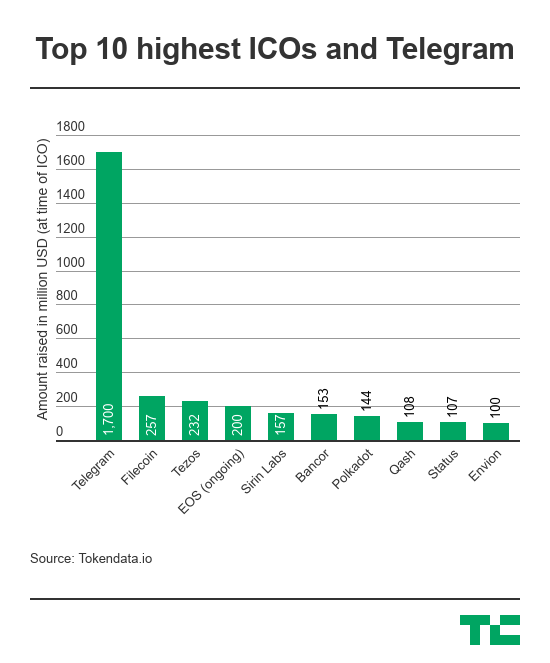Crowdfunding ECO Town Hall Ask to Join
Register and request to join to see more.

Telegram’s billion dollar #ICO has become a mess (for investors)
In part, the consequences of a fast moving industry facing regulatory uncertainty ...
Telegram’s ICO was supposed to be a record-breaker to develop a platform that brings the decentralized internet to life. Instead, it has become a mess with the tightly controlled fundraising process in disarray as early backers sell their tokens for handsome returns...
Full article:
https://techcrunch.com/2018/05/03/telegrams-billion-dollar-ico-has-become-a-mess/

Newly Formed Institute for Blockchain Innovation Backs #ICO Alternative
"ICO alternative" sounds like plain ole' crowdfunding ... although they label it: "JOBS Crypto Offering (JCO)"
Full article:
The JCO works in three stages:
-
Stage One — Under Regulation D (Reg. D), a company offers purchase agreements to accredited investors in a presale. These purchase agreements are being referred to informally as a “Block-SAFE.”
-
Stage Two — Once the company meets the capital raise goal they have set, they submit documentation to the U.S. Securities and Exchange Commission (SEC) to get approval to issue digital equity securities to the public under Reg. A+, or by filing a registration statement under the Securities Act.
-
Stage Three — Under Reg. A+, the securities become available to both accredited and non-accredited investors, and can then be traded on an alternative or traditional exchange approved by the SEC. According to the IBI website, “These equity tokens represent one share of stock in the company, and they are able to pay dividends.”

NASDAQ EYES BECOMING A #CRYPTOCURRENCY EXCHANGE PLATFORM
Adena Friedman, the CEO of Nasdaq says the company is interested in becoming a cryptocurrency exchange platform. Nasdaq is the second-largest stock exchange in the world in terms of market capitalization. The company is the latest in a slew of institutional investors looking to enter the burgeoning cryptocurrency market.
Read more ...
http://bitcoinist.com/nasdaq-eyes-becoming-a-cryptocurrency-exchange-platform/
It would be intereting to see if OTC might follow -- or get ahead of NASDAQ -- in doing the same?
#j...@...com

"Trade Group" Asks U.S SEC Not To Classify Ethereum As A Security
RE: "Trade Group" (so says Ethereum news) headline "Trade Group Asks U.S SEC Not To Classify Ethereum As A Security"
The Venture Capital Working Group consists of lawyers and representatives from venture capital companies Andreessen Horowitz and Union Square Ventures. The group met with officials at the U.S Securities and Exchange Commission (SEC) on March 28th, 2018, to discuss initial coin offering (ICO) tokens, but its since been revealed the group put forward a specific case for the classification of Ethereum.
Reports state that the arguments failed to sway the SEC and it’s as yet unclear as to whether the SEC will continue to classify Ethereum as a security, based on its origins from an ICO, or whether it will view Ethereum based on its current characteristics.
https://ethereumworldnews.com/trade-group-asks-u-s-sec-not-to-classify-ethereum-as-a-security/
A better headline on the same topic by Politico:
Venture capital firms seek regulatory shelter for digital token startups

If you sue a billionaire president, can #crowdfunding level the legal playing field?
Headline from a Washington Post story which has focuses on current crowdjustice campaign ... (Clifford - aka Daniels - v. Trump et al.)
https://wapo.st/2H1E1Y5?tid=ss_tw&utm_term=.2d45db2d6572



